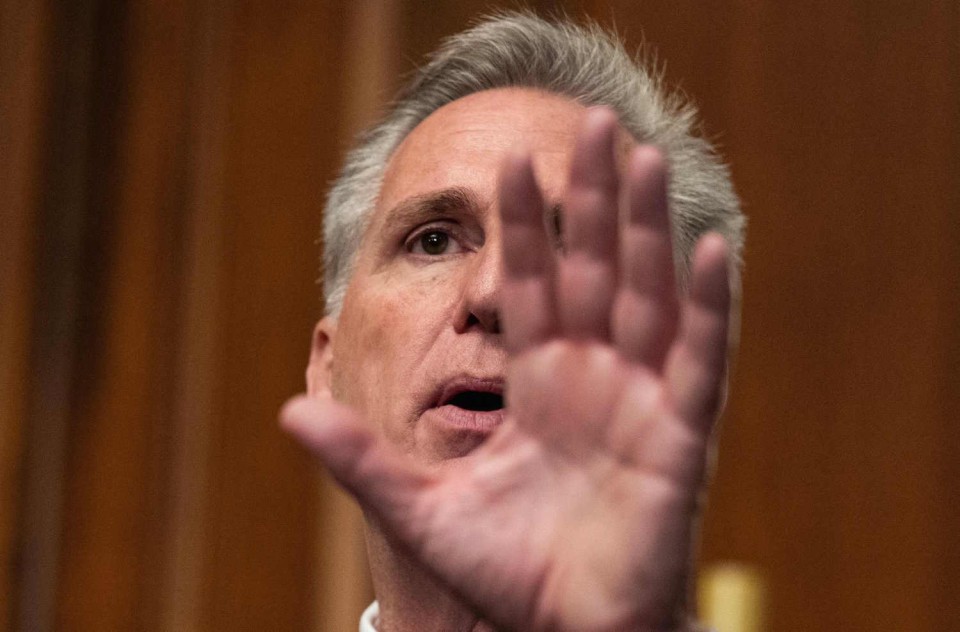
By Maria DANILOVA
WASHINGTON, Sept 30, 2023 (AFP) – Last-ditch moves to prevent a US government shutdown took a dramatic step forward Saturday, as Democrats overwhelmingly backed an eleventh-hour Republican measure to keep federal funding going for 45 days, albeit with a freeze on aid to Ukraine.
The stopgap proposal adopted by the House of Representatives with a vote of 335-91 was pitched by Speaker Kevin McCarthy just hours before a midnight shutdown deadline that would have seen millions of federal employees and military personnel sent home or required to work without pay.
The deal, which was opposed by 90 House Republicans, still has to be approved by the Democrat-controlled Senate.
CNN quoted an administration official as saying the White House would likely support the bill in order to keep the government open with the expectation of being able to restore Ukraine aid later.
The shutdown crisis was largely triggered by a small group of hardline Republicans who had defied their own party leadership to scupper various temporary funding proposals as they pressed for deep spending cuts.
Saturday’s bill kept federal spending at current levels and House Democratic leader Hakeem Jeffries called the vote “a complete and total surrender by right-wing extremists.”
But the result could end up costing McCarthy his job. The 21 hardliners had threatened to remove him as speaker if a stopgap measure they opposed was passed with Democrat support.
One of the hardliners, Lauren Boebert, declined to say afterwards whether the group would try to force McCarthy out, but she was clearly unhappy with the vote.
“There are too many members here who are comfortable doing things the way they’ve been done since the mid ’90s,” she told reporters. “And that’s why we’re sitting at $33 trillion in debt.”
McCarthy sought to convey confidence both about his own future and the prospects for securing a final agreement within the new 45-day deadline.
“In 45 days we should get our work all done,” he said, while seeming to offer a hand to the hardliners, saying, “I welcome those 21 back in.”
While the crisis highlighted Republican divisions, Jeffries held his caucus together, with only one member defecting in a protest of the lack of Ukraine aid.
– ‘No blank check’ –
Arming and funding Ukraine in its desperate war against the Russian invasion has been a key policy plank for President Joe Biden’s administration and, while the stopgap is temporary, it does raise questions over the political viability of renewing the multibillion-dollar flow of assistance.
“This is enough to keep the government open, and I’m not going to shut the government down over foreign aid,” one House Democrat, Jared Moskowitz, told CNN.
McCarthy said Russia’s invasion was “horrendous” but insisted there could be “no blank check” for Kyiv.
“I have a real concern of what’s going to happen long term, but I don’t want to waste any money,” he said.
With tensions running high and Democrats poring over the text of McCarthy’s proposal, one of their lawmakers, Jamaal Bowman, triggered a fire alarm in a building housing congressional offices an hour before Saturday’s vote.
Bowman’s spokesman insisted it was an accident, but Republicans accused him of seeking to delay proceedings.
Barring a final agreement, the freeze of all but critical government services was set to start after midnight (0400 GMT Sunday), immediately delaying salaries for millions of federal employees and military personnel.
A shutdown would mean the majority of national parks, for example — from the iconic Yosemite and Yellowstone in the west to Florida’s Everglades swamp — would be closed to public access beginning Sunday.
With student loan payments resuming in October, officials said Friday that key activities at the Federal Student Aid office would continue for a couple of weeks.
But a prolonged shutdown could cause bigger disruptions, percolating through the wider economy.







